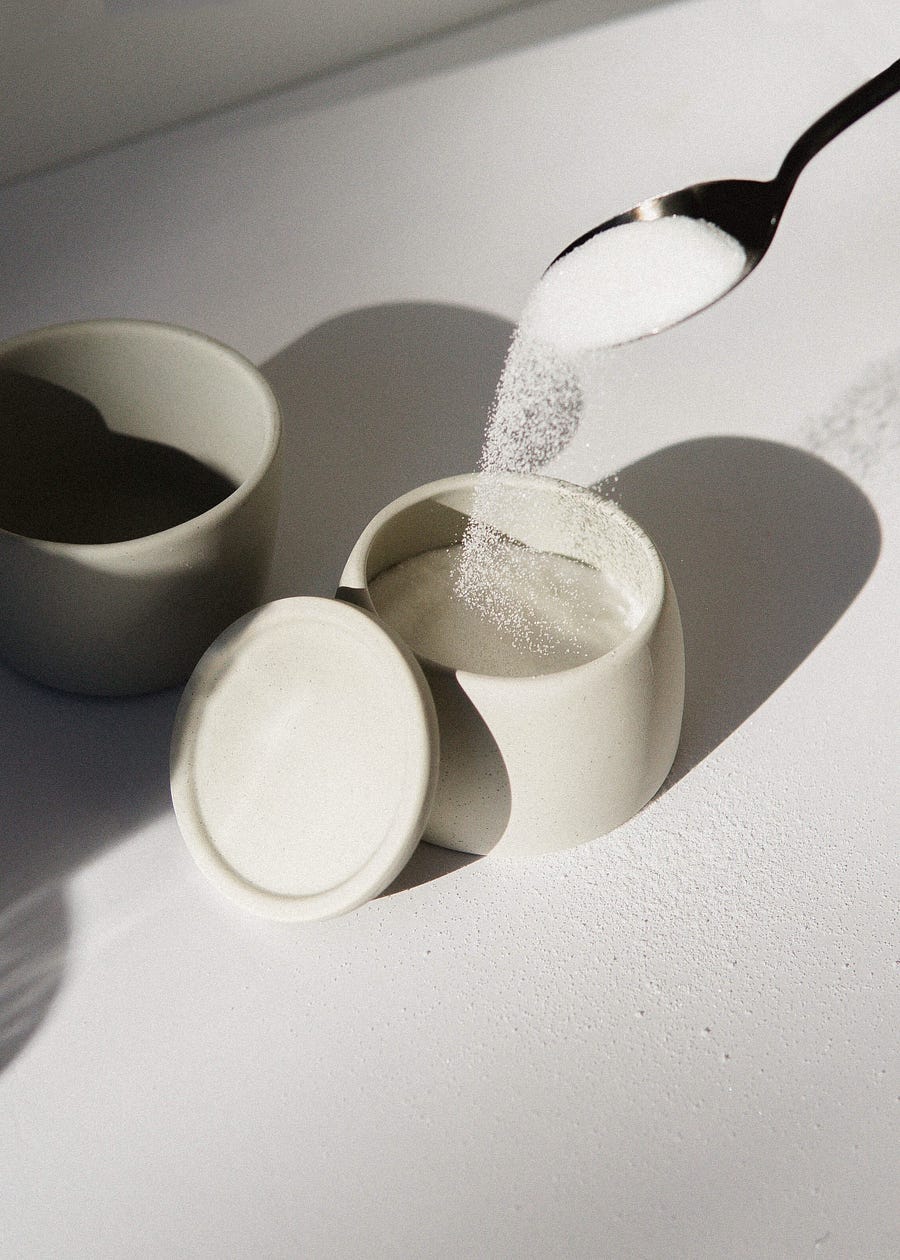All you need to know about stevia
Stevia has been growing in popularity lately as a natural sweetener. Derived from the leaves of the Stevia rebaudiana plant, this plant-based alternative to sugar has gained significant traction among health-conscious individuals and those seeking lower-calorie options. Is it any good?

Visit activeplantbased for professional help and plant-based nutrition training.
Table of contents
FIRST BOTTOM LINE :)
Side note: Most white sugars are not vegan. Do not fret: There are plenty of other plant-based sweeteners, with Stevia being among the top ones on that list.
Bottom line
Stevia is alright to consume in moderation and as part of a balanced and green diet, especially if you absolutely must use a sweetener, though it is not without side effects.
If you have to choose what to consume instead of sugar, the answer is: Nothing.
household sugar < non-caloric artificial sweeteners < no sweetener at all
Stevia, sugar & health
Regular sugar, sucrose, is a high-calorie carbohydrate. It contains approximately 4kcals per gram. This means that a teaspoon of sugar, which weighs about 4 grams, provides around 16kcals, meaning the calorie ratio between stevia and sugar is significant.
Because stevia offers sweetness without adding any substantial calories, it’s used as a low-calorie or calorie-free alternative in various food and beverage products.
Stevia & diabetes
Because stevia is very low in calories, it has a minimal impact on blood sugar levels. Using it as a sugar substitute can help you maintain better control over your blood sugar levels, since it doesn’t cause a rise, thus being a great option for people with diabetes.
Big “but”
“We recently demonstrated that NAS consumption could induce glucose intolerance in mice and distinct human subsets, by functionally altering the gut microbiome. {…} Several physiological mechanisms have been suggested for these phenomena, such as stimulation of intestinal sugar absorption, disruption of the ability of sweet taste to signal caloric consequences, an increase in appetite and impaired glycemic or insulin responses. {…} Short term stevia consumption in rats was suggested to be associated with weight gain, in a yet unknown mechanism.” (1)
Big “but” explained:
Non-caloric artificial sweeteners (NAS), like stevia, can cause problems with how your body processes sugar in both mice and people. This happens because these sweeteners can affect the helpful bacteria in your gut, which can affect how your body handles sugar. Some possible explanations for these effects include making your intestines absorb more sugar, disrupting the normal way your body recognises sweet tastes and their calorie content, increasing your appetite, and interfering with how your body regulates blood sugar and insulin. Additionally, studies have suggested that rats who consumed stevia for a short period of time gained weight, although the exact reason for this is still unknown.
Other side effects of stevia
Although rare, allergic reactions to stevia can occur in certain individuals. If you experience any signs of an allergic reaction, discontinue use and seek medical attention.
Also, stevia may interact with certain medications or herbal supplements. If you have any underlying health conditions or take medications regularly, it’s advisable to consult with a healthcare professional to ensure there are no potential interactions.
Availability of stevia
Stevia is widely available in many parts of the world. You can find it in most supermarkets, health food stores, and online retailers.
It is available in different forms, such as
- powdered stevia
- liquid drops
- granules
- extracts
Be aware of the stevia blend. Some stevia products on the market are blended with other sweeteners or bulking agents to improve their texture or taste.
These blends could contain other ingredients like erythritol, dextrose, or maltodextrin. So, while those blends are often marketed as “sugar-free,” some blends may contain ingredients such as erythritol, dextrose, or maltodextrin, which are carbohydrates and can be metabolised by the body like sugars.
The effects of these ingredients on health can be different for each person, depending on your specific diet and sensitivities.
Uses of stevia
- sugar substitute in beverages, baked goods, and other recipes that require sweetness.
However, using too much stevia or using it in certain applications may result in a slightly bitter aftertaste, so it may take some time to find the right amount. When baking, the required amount of stevia depends on the stevia product you’re using.
Stevia fun facts
- Stevia is named after Petro Jacobus Stevus, a Spanish botanist and doctor
- Stevia is estimated to be around 200 to 300 times sweeter than sugar. The sweetness, however, really depends on the product
- Stevia is an herb
- Coca-Cola sweetened with stevia contains over 50% fewer calories compared to regular sugar-sweetened Coca-Cola
- Stevia does not raise blood sugar levels
- You can easily grow your own Stevia at home, at a 20–30°C mostly sunny environment
Thank you for reading and supporting our love for vegan nutrition.
─ activeplantbased 🐇

